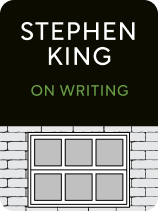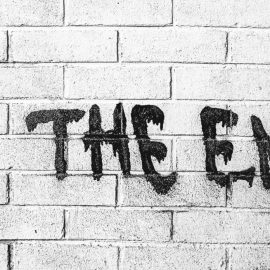

This article is an excerpt from the Shortform summary of "On Writing" by Stephen King. Shortform has the world's best summaries of books you should be reading.
Like this article? Sign up for a free trial here .
Why is Stephen King’s horror writing successful? How does he come up with so many ideas, and how can you use his strategies to come up with ideas for great writing?
Stephen King’s horror writing career has spanned decades, and he started off as a horror fan writing short stories. Stephen King explains in his memoir his love for horror, and how he comes up with writing ideas.
Read more about Stephen King’s horror writing career and how to come up with writing ideas.
Stephen King: Horror Fan and Writer
From his early teens, Stephen King loved movies. There were only two movie theaters in town. One theater showed only family-friendly fare—Disney cartoons and musicals. King found these wholesome, predictable, and boring. He didn’t want to see manicured actors singing happily on a stage; he wanted destruction of cities and monsters devouring humans. For Stephen King, horror was must more interesting.
He found these films in plentiful supply at the other theater. King fondly recalls a dozen movies, ranging from I Married a Monster from Outer Space to Attack of the 50 Ft. Woman. He’d watch a movie every weekend he could and anytime he could hitch a ride.
One particular favorite was a loose adaptation of Poe’s The Pit and the Pendulum (his favorite scene was one showing the corpse of a woman who had been buried alive, her mouth agape in a scream). He was so enamored of the film that he decided he’d write a novelized adaptation of it (“blissfully unaware” of the plagiarism implications), then sell the book to his classmates for a quarter apiece. The plan worked better than expected—he’d replicated the film’s horror well in words—and he sold $9 worth of books.
But the good times didn’t last. He was called into the principal’s office, where he was admonished for selling his wares in a place of education.
Even worse, his teacher castigated him for wasting his writing talent on this kind of trash. This comment stuck with him for years. He would review his writing with shame, wondering if he was indeed wasting his talent. In the present day, King notes that every writer (and every creator, really) will at some point be told that they are wasting their talent and be scolded for not working on something more worthwhile.
How to Get Started
Stephen King is a horror writer with years of experience. So if you’re a new writer, it’s asking too much to adopt King’s demanding daily process. Here’s how he suggests you get started:
- Set a habit: define your writing location and carve out a daily time when you’ll be writing.
- During that time, shut your door.
- Set your daily goal low and achievable. He suggests 1,000 words a day. Until you meet this goal, your door stays shut.
- Take no more than one day off a week.
What to Write About
You can write about anything. The only requirement is that you tell the truth. For Stephen King, horror is the way to achieve that.
Good writing pulls readers in by telling the truth. The characters seem real and behave in recognizable ways; the reader sees herself and her beliefs embedded in the story. In contrast, you likely stop reading a book when you can’t identify with any of the characters and find them implausible.
It’s common advice for starting writers to “write what you know.” Interpret this liberally. It’s not what you literally know (otherwise you couldn’t write about going to Mars) but rather about the truths you understand—what life feels like, how romance and friendships develop, the details of your work. Don’t take “write what you know” to artificially limit what you feel capable of writing about.
Before becoming a writer, John Grisham was a lawyer, and he took what he knew about law (details of whitecollar crime, the savagery of law firms) to write his breakthrough novel The Firm. The world and characters are believable, because they came from John Grisham’s truth.
You’ll probably start by writing in the genres you like to read—if you’re a science fiction fan, you’ll write science fiction. You might even emulate the style of writers you like, which is nearly unavoidable for novice writers until they develop their own voices.
What you shouldn’t do is write what you think other people will like—friends, colleagues, critics, book buyers. Don’t try to emulate the form, plot and style of bestselling authors. All this takes you away from authenticity, and your readers will know.
So write what you know and like, and bring your truths into the story. You know some unique truths about the world, which will make your writing unique.
Stephen King is a horror writer, but even if you prefer to write about other topics, his advice on writing still applies.

———End of Preview———
Like what you just read? Read the rest of the world's best summary of Stephen King's "On Writing" at Shortform .
Here's what you'll find in our full On Writing summary :
- Stephen King's personal writing habits that led to superstar books like Misery and It
- How to make a story and characters feel real
- Why you should never use adverbs






